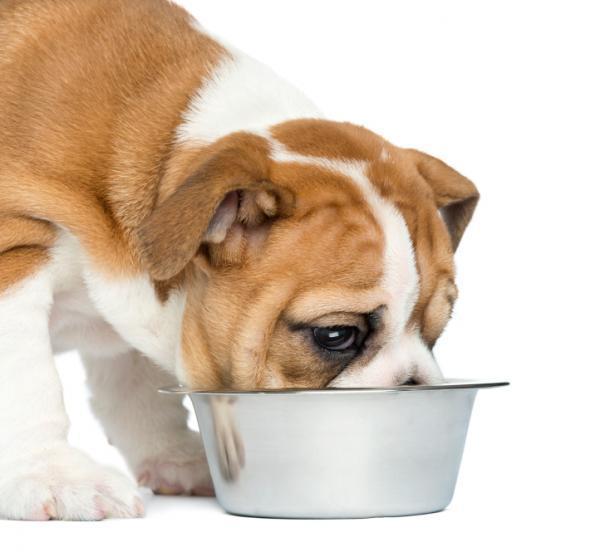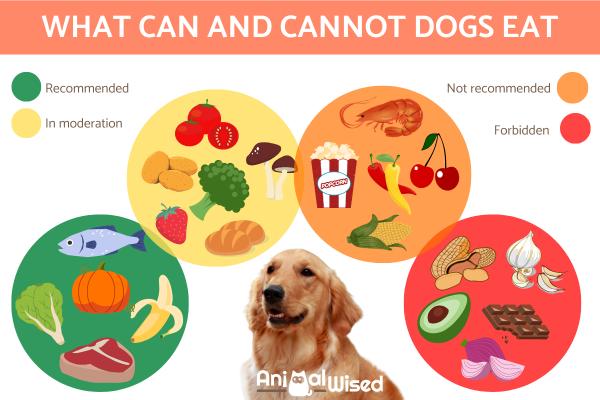Healthy Diet for Dogs



See files for Dogs
Domesticated dogs are largely carnivores that eat some omnivorous foods. You have probably thought more than once about whether or not the food you are about to give your dog is good for them. While there are some general rules about what you should or should not feed your dog, each dog is an individual. Factors such as breed, age and size, activity and lifestyle are all factors that have a direct impact on their diet.
You can learn everything you need to know about dogs' diets, what foods to feed them and what to avoid in the following AnimalWised article.
The diet of dogs
While it is often assumed that dogs can eat anything, this is not true. Not all foods are good for your dog, and some can even be harmful to their health. That's why it's important to know which foods should be on your dog's menu and which ones you should rather avoid.
The first thing to remember when feeding dogs is that dogs are mammals, mostly carnivores that can also eat some omnivorous foods. This means that for the first few weeks of their lives, they feed exclusively on their mother's milk. In fact, they have to stay with her and the rest of the litter for at least eight weeks, but after about a month they will start showing interest in solid food within their reach.
When the puppies are two months old, it is time to start weaning them and offer them a high-quality food specially designed for puppies, taking into account their needs as carnivores and animals in a rapid growth phase.
The basis of your dog's diet should be a high quality, balanced dog food that is appropriate for their life stage. In fact, your dog's nutritional needs depend on a number of factors, and is crucial that you take them into account in order to adapt the diet to your dog's situation. The aspects that you should consider are:
- Age: the age of your dog affects their diet because nutritional needs change from puppy to adult dog.
- Health: the diet varies to adapt the food to the requirements of the body at that time.
- Activity: if your dog has a high level of activity, he will need a diet with different characteristics.
- Size: the amount of food for dogs varies according to their size. Be careful not to feed too much or too little.
A varied and complete diet adapted to your dog's needs is the basis for a 100% healthy dog's life. Exercise, activity, training, companionship and affection are also important, but the diet is crucial.
You may also be interested in this other article where we talk about weaning and feeding puppies.
Recommended food for dogs
As mentioned earlier, a balanced diet is critical to your dog's health. For a diet to be balanced, it must contain the following characteristics:
- Proteins: proteins should be the basis of the dog's diet. They are very important because they contribute to the maintenance of muscle mass of the animal and promote the maintenance of hair, nails, skin, and bones. They are also involved in the proper functioning of the organs. You can provide your dog with these nutrients through various foods such as meat, fish, eggs or bones.
- Carbohydrates, fiber and cereals: when feeding dogs, these nutrients should make up about 15%. In this category you will find foods such as oils, rice, wheat, or corn. These nutrients provide energy to the dog and support the function of the digestive system.
- Fruits and vegetables: the percentage of nutrients from fruits and vegetables in your dog's diet is very small. You can give your dog raw fruit, but vegetables should be cooked to make them easier to digest.
- Vitamins and minerals: vitamins A, B, C, D, E and K should also be included in your dog's diet. They help process the nutrients your dog ingests and also have specific functions. When it comes to minerals, phosphorus and calcium are key because they are involved in the formation of bones, teeth and cartilage, growth and nervous system function. Other minerals that must be present are iron, magnesium, potassium, sodium, sulfur and chloride.
Do not miss this other article where we talk in more detail about recommended fruits and vegetables for dogs.

Forbidden food for dogs
In general, you must avoid foods whose ingredient list is based on animal or vegetable by-products, artificial substances and sugars, and spices. There are many common foods for human consumption that we often share with our dogs. However, many of them can cause serious health problems. We have listed some of these foods below:
- Grapes and raisins: eating them can cause severe gastrointestinal damage, acute kidney failure, and even death.
- Avocado: all the components of the avocado are toxic. The toxic substance contained in avocado is called persin. Symptoms observed include breathing problems, an enlarged abdomen, and heart problems.
- Caffeine: it contains substances that stimulate the central nervous system and the cardiac system and can cause vomiting, hyperactivity, tachycardia, and even death within a few hours.
- Onions and garlic: onions, in any form (raw, cooked or powdered), are very toxic to dogs. They contain compounds that can damage a dog's digestive system, as it is unable to digest them. They can also lead to poisoning.
- Sausage and cured meats: although these meats are high in protein, they usually contain a lot of fat. They are also very salty, which can cause severe stomach pain or other complications.
- Milk and dairy products: most species become lactose intolerant once they are no longer breastfed. Most animals do not have the enzyme needed to break down the sugar in milk, and this can lead to vomiting, diarrhea, and other stomach problems.
Please note that this is not a complete list and there are many other foods that are forbidden for dogs. In case of doubt, always consult with a specialist first.
On the other hand, food intolerances and allergies are a relatively common problem in dogs. Although each specimen may react badly to a different ingredient, some are known to trigger this type of disorder with higher probability. Examples include wheat, dairy products, or soy. Therefore, for the most sensitive dogs, it makes sense to avoid these types of ingredients or even resort to so-called hypoallergenic foods.
You may be interested in this other article where we talk about dog food allergies, their symptoms, causes and treatment.
General precautions and recommendations
Not only should you make sure your dog is getting the right food and stay away from foods that could harm them, but you should also take certain precautions when feeding your dog.
- Choose good quality meat, as some pet meat and bone products contain preservatives that can be harmful to your dog's health.
- Maintain proper food hygiene, as the risk of bacterial infection from food, such as Campylobacter or Salmonella, is high for both you and your dog.
- Do not offer food that contains sugar, salt or other spices.
- Avoid artificial preservatives, colorings or flavorings.
- Bones and raw meat are not recommended because they can break teeth and cause internal blockages. Also, raw bones contain bacteria that can make both animals and humans sick.
- If for any reason you replace one food with another, it is recommended to do so gradually. Dose both products for a week and gradually increase the dose of the new food until it is completely switched.
- The average ratio of water they need is 60 ml per kilo of body weight. This amount should be increased if it is a puppy or a nursing bitch, if the climate is very hot or if you have been exercising.
We at AnimalWised recommend that you see your veterinarian or nutritionist to create a diet that is tailored for the specific needs of your dog.
You may be interested in this other article where we talk in more detail about what foods can be harmful to your dog's health.
If you want to read similar articles to Healthy Diet for Dogs, we recommend you visit our Healthy diets category.






